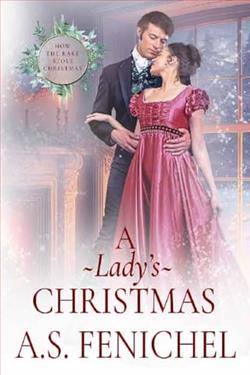
A Lady's Christmas
by A.S. Fenichel
The only bad part about growing up as the ward of the Duke of Stratham was the occasional visits from his nephew and heir, Theo. Unable to remember her parents, Stratham was the only father Gwen ever had, and now he’s gone too. Rather than suffer the indignity of living under the rule of her nemesis, she joined The Everton Domestic Society. At least she can be of use to someone. She’s fully capable of running a large estate and is of the age to make her own decisions.
Upon arrival at his newly inherited estate, Theo Dandridge, the sixth Duke of Stratham, finds the grounds and house in perfect order. The only thing amiss is his uncle’s ward, who is nowhere to be found. Gwen has always been a burr under his saddle and now he’s forced to go fetch her from her new employer. Most say that she is kind—to everyone but him—and that children love her. According to the staff, she’s been running the ducal estates for six years. After spending so many years focused on Gwen’s flaws, perhaps it’s Theo’s character that needs investigation…
.
Read
A Lady's Christmas on http://kissnovel.net
Martial Peak Reviews
A.S. Fenichel's A Lady's Christmas is a delightful historical romance that weaves together themes of independence, self-discovery, and the transformative power of love. Set against the backdrop of Regency England, this novel offers readers a charming escape into a world where societal expectations and personal desires often clash, yet ultimately lead to a heartwarming resolution.
At the heart of the story is Gwen, a young woman who has grown up as the ward of the Duke of Stratham. Her life has been shaped by the absence of her biological parents and the presence of a surrogate father figure in the Duke. The narrative begins with the Duke's passing, which leaves Gwen at a crossroads. Rather than submit to the authority of Theo, the Duke's nephew and heir, she chooses to assert her independence by joining The Everton Domestic Society. This decision is a testament to her strength and determination, qualities that make her a compelling protagonist.
Gwen's character is richly developed throughout the novel. She is portrayed as a capable and intelligent woman who has been managing the ducal estates for years, a fact that underscores her competence and resourcefulness. Her decision to leave the estate and seek employment elsewhere is not just an act of defiance but also a quest for self-fulfillment. Fenichel skillfully explores Gwen's internal struggles as she navigates her new life, highlighting her resilience and growth.
Theo Dandridge, the sixth Duke of Stratham, serves as a perfect foil to Gwen. Initially, he is depicted as somewhat arrogant and dismissive, viewing Gwen as a mere nuisance. However, as the story unfolds, Theo undergoes significant character development. His journey from a man who is focused on Gwen's perceived flaws to one who recognizes and appreciates her strengths is both believable and satisfying. This transformation is a central theme of the novel, emphasizing the idea that true understanding and love often require a reevaluation of one's own biases and assumptions.
The dynamic between Gwen and Theo is a classic example of the enemies-to-lovers trope, a staple in romance literature. Fenichel handles this transition with finesse, allowing their relationship to evolve naturally. The tension between them is palpable, yet it is balanced with moments of tenderness and humor. Their interactions are marked by witty banter and genuine emotion, making their eventual romance all the more rewarding.
One of the novel's strengths is its exploration of societal norms and the constraints placed on women during the Regency era. Gwen's decision to join The Everton Domestic Society is a bold move that challenges the traditional roles assigned to women. Fenichel uses this plot device to comment on the limited opportunities available to women and the courage required to defy societal expectations. This theme resonates with contemporary readers, offering a historical perspective on issues of gender equality and personal agency.
The setting of A Lady's Christmas is vividly depicted, with Fenichel's attention to detail bringing the Regency period to life. The descriptions of the estate, the social gatherings, and the customs of the time immerse readers in the era, enhancing the overall reading experience. The festive backdrop of Christmas adds an extra layer of charm to the story, infusing it with warmth and a sense of hope.
In comparison to other works in the historical romance genre, A Lady's Christmas stands out for its strong character development and thematic depth. Fans of authors like Julia Quinn and Mary Balogh will find much to enjoy in Fenichel's writing. Like Quinn's Bridgerton series, this novel combines romance with social commentary, while Balogh's influence can be seen in the nuanced portrayal of complex characters and relationships.
Overall, A Lady's Christmas is a captivating read that offers more than just a romantic storyline. It is a thoughtful exploration of identity, love, and the courage to forge one's own path. Fenichel's engaging prose and well-crafted characters make this novel a standout in the genre, appealing to both romance enthusiasts and readers seeking a story with substance.
For those looking to escape into a world of romance and intrigue, A Lady's Christmas is a perfect choice. It is a testament to the enduring appeal of historical romance and a reminder of the timeless nature of love and self-discovery.
























Reviews 0
Post a Reviews: